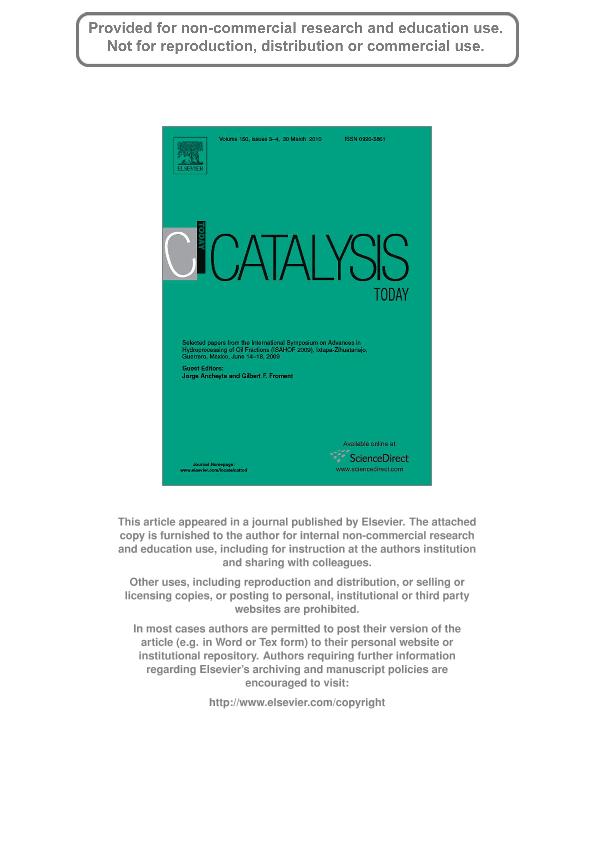Mostrar el registro sencillo del ítem
dc.contributor.author
Castaño, Pedro
dc.contributor.author
Arandes, José M.
dc.contributor.author
Olazar, Martin
dc.contributor.author
Bilbao, Javier
dc.contributor.author
Pawelec, Bárbara
dc.contributor.author
Sedran, Ulises Anselmo

dc.date.available
2018-08-14T19:27:08Z
dc.date.issued
2010-03
dc.identifier.citation
Castaño, Pedro; Arandes, José M.; Olazar, Martin; Bilbao, Javier; Pawelec, Bárbara; et al.; Effect of hydrogen on the cracking mechanisms of cycloalkanes over zeolites; Elsevier Science; Catalysis Today; 150; 3-4; 3-2010; 363-367
dc.identifier.issn
0920-5861
dc.identifier.uri
http://hdl.handle.net/11336/55475
dc.description.abstract
Hydrocracking of secondary interest refinery streams (high aromatic content) can yield valuable products for transportation and petrochemical industry. In order to promote the hydrogenation and cracking steps, a bifunctional catalyst (metal + acid function) is required. We have studied the effect of the operating conditions on cycloalkane (product of aromatic hydrogenation) ring opening over a monofunctional HZSM-5 zeolite, by focusing on the effect of hydrogen in the cracking mechanisms. Methylcyclohexane has been selected as the test reactant and the conditions used corresponds to temperature, 250-450 °C; space velocity, 0.7-1.1 h-1; pressure, 2-80 bar; hydrogen/methylcyclohexane molar ratio, 1-79; conversion, 0-100% (integral reactor). At these conditions the zeolite catalyses hydrogenation as well as cracking (bifunctional capabilities), thus the cracking mechanisms are directly affected by hydrogen as products (alkenes) and intermediates (carbenium ions) are saturated. The overall effect of rising hydrogen partial pressure is an enhancement of (hydro)isomerization and monomolecular cracking, that is, an increase of the yield/selectivity of methane, ethane, penthane and isoalkanes.
dc.format
application/pdf
dc.language.iso
eng
dc.publisher
Elsevier Science

dc.rights
info:eu-repo/semantics/openAccess
dc.rights.uri
https://creativecommons.org/licenses/by-nc-nd/2.5/ar/
dc.subject
Cracking
dc.subject
Cycloalkanes
dc.subject
Hzsm-5 Zeolite
dc.subject
Methylcyclohexane
dc.subject
Ring Opening
dc.subject.classification
Otras Ingeniería Química

dc.subject.classification
Ingeniería Química

dc.subject.classification
INGENIERÍAS Y TECNOLOGÍAS

dc.title
Effect of hydrogen on the cracking mechanisms of cycloalkanes over zeolites
dc.type
info:eu-repo/semantics/article
dc.type
info:ar-repo/semantics/artículo
dc.type
info:eu-repo/semantics/publishedVersion
dc.date.updated
2018-08-14T14:32:12Z
dc.journal.volume
150
dc.journal.number
3-4
dc.journal.pagination
363-367
dc.journal.pais
Países Bajos

dc.journal.ciudad
Amsterdam
dc.description.fil
Fil: Castaño, Pedro. Universidad del País Vasco; España
dc.description.fil
Fil: Arandes, José M.. Universidad del País Vasco; España
dc.description.fil
Fil: Olazar, Martin. Universidad del País Vasco; España
dc.description.fil
Fil: Bilbao, Javier. Universidad del País Vasco; España
dc.description.fil
Fil: Pawelec, Bárbara. Consejo Superior de Investigaciones Científicas. Instituto de Catálisis y Petroleoquímica; España
dc.description.fil
Fil: Sedran, Ulises Anselmo. Consejo Nacional de Investigaciones Científicas y Técnicas. Centro Científico Tecnológico Conicet - Santa Fe. Instituto de Investigaciones en Catálisis y Petroquímica "Ing. José Miguel Parera". Universidad Nacional del Litoral. Instituto de Investigaciones en Catálisis y Petroquímica "Ing. José Miguel Parera"; Argentina
dc.journal.title
Catalysis Today

dc.relation.alternativeid
info:eu-repo/semantics/altIdentifier/doi/http://dx.doi.org/10.1016/j.cattod.2009.09.013
dc.relation.alternativeid
info:eu-repo/semantics/altIdentifier/url/https://www.sciencedirect.com/science/article/pii/S0920586109006166
Archivos asociados
